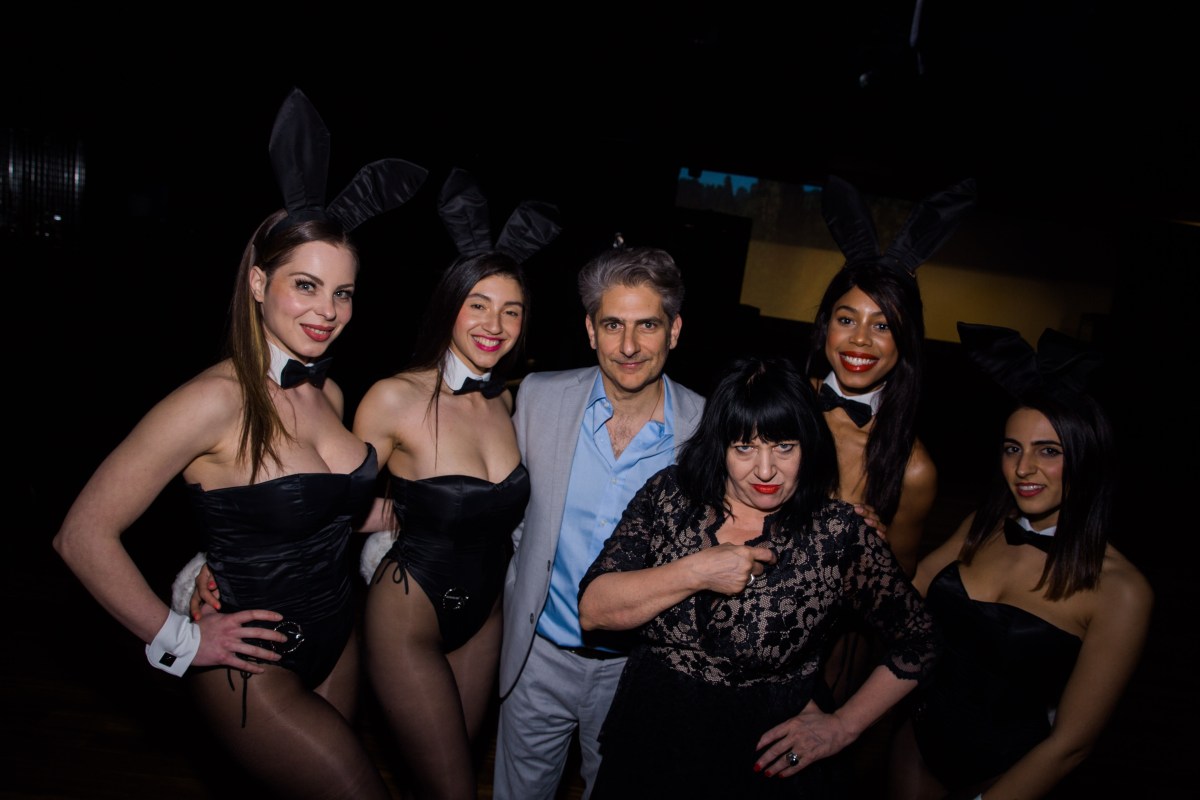The acoustics in the Playboy Club are less than ideal.
That’s what musician Sylvia Black tells us, anyway. “It’s a beautiful club. Beautiful ladies. Good food,” the singer croons into the microphone after her first set. “It’s just not a live music venue.”
It’s a Wednesday night at the Manhattan Playboy Club in Hell’s Kitchen. The club’s black and gold entrance gleams unexpectedly on a relatively quiet block of W 42nd Street, and the lineup for tonight’s event — featuring Lydia Lunch and The Sopranos’ Michael Imperioli in celebration of National Poetry Month — sounds like a MadLib.
“The Playboy Club is pleased to announce Verbal Burlesque,” drawls the invitation, “combining the dynamic spoken word histrionics of Lydia Lunch, one of the genre’s most celebrated and controversial performers, and actor/director Michael Imperioli, reading from his debut novel, The Perfume Burned His Eyes, along with an intimate evening of musical vérité by sexy songstress, Sylvia Black.”
The “sexy songstress,” positioned with a microphone in a small section of the red-walled club surrounded by sleek, black leather seating, calls for more volume until I can feel her voice literally vibrating through my chest.
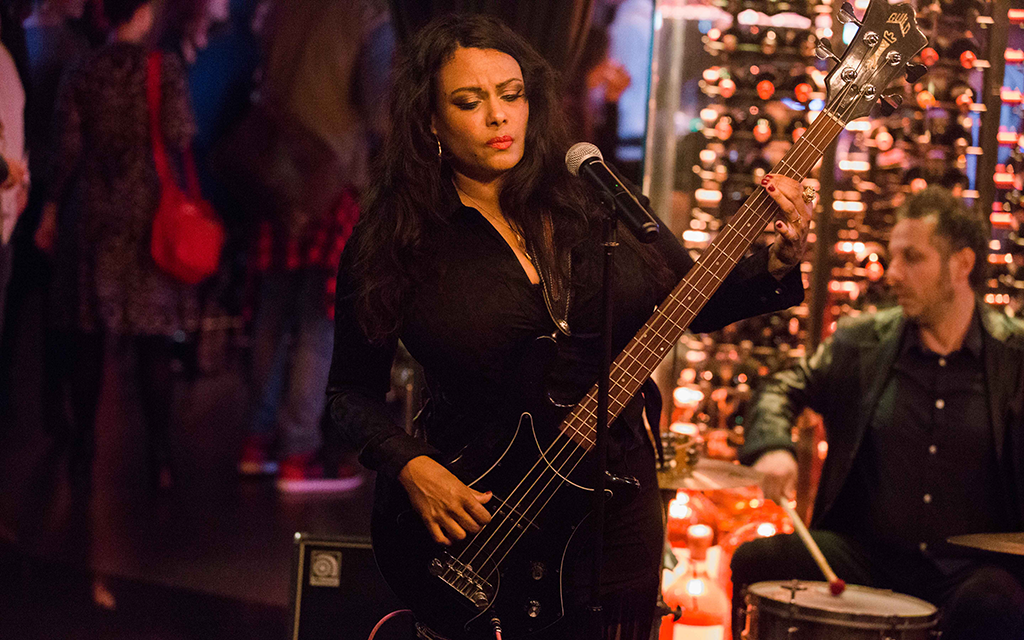
“It’s too loud,” someone jeers.
“Shut up, Maggie,” another voice yells in response.
It’s nearing 9 p.m. and the club continues to fill with young to middle-aged professionals. Waitresses in black bunny ears weave in and out of the growing crowd, which seems to include at least as many women as men, and, as one out-of-town guest pointed out to me, quite a few couples. Whether any of them pay the club’s annual membership fee that runs from $5,000 for “Lounge” access to $100,000 for the “Mansion” package, I don’t know. Strums from Black’s accompanying guitarist continue to vibrate through the club’s perfumed air, and it feels like being inside of a Hollister — loud, dark and as heavily branded as it is scented.
This somehow strikes me as fitting, probably because Playboy first broke into my preteen consciousness around the same time I began dragging my mother into those loud, dark stores and begging her to buy me any article of clothing branded with an embroidered seagull — the epitome of early-aughts fashion.
My introduction to Playboy had none of the secrecy or taboo of the typical cliche. I never had to steal copies of the magazine from my father or stash them under my bed. (If he was a subscriber, I was never any the wiser.) Rather, my generation’s Playboy came to us prepackaged and rebranded for a younger, unprecedentedly female demographic in the form of reality television.
Back before America pledged allegiance to the Kardashians, Hugh Hefner’s three girlfriends, Holly Madison, Bridget Marquardt and Kendra Wilkinson, were the reigning trio of busty reality TV queens dominating the E! network as the stars of The Girls Next Door.
The show premiered in 2005 and ran for six seasons, spawning multiple spin-offs. Playboy, with its unapologetic penchant for all things plastic and performative, seemed tailor-made for the reality television of the era, then dominated by the likes of Paris Hilton and Nicole Richie. While current execs have lamented the brand’s “demeaning” if lucrative foray into reality television, Playboy’s signature branding of a polished and pushed-up image of female sexuality as “the girl next door” had already mastered the art of selling fantasy as reality decades before the show premiered.
What then, I wonder as no wave icon Lydia Lunch takes the stage, brings one of the art community’s most aggressively underground performers to the Playboy Club?
In many ways, Lunch is the anti-Playboy. The infamous Lower Manhattan legend has long scorned the commercialization of pop culture from behind a fringe of heavy black bangs, in stark contrast to Playboy’s signature blonde bombshells. In over 40 years as a performer, Lunch has staunchly resisted the siren call of the mainstream entertainment industry. “If you’re doing it for the money, you’re not doing art. You’re doing commerce,” she told The Guardian back in 2013.
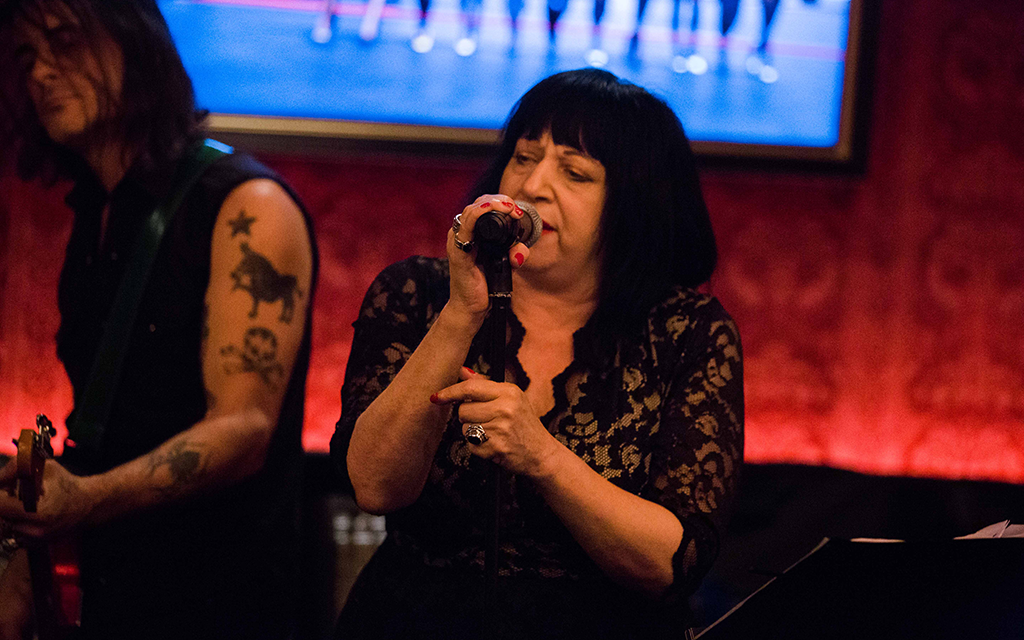
Tonight, dressed in head to toe black that stands out starkly against her pale skin, Lunch still looks the part of an underground icon. “I’m Lydia Lunch, and this is Verbal Burlesque,” she rasps into the microphone.
If there’s one thing Lunch and Playboy have in common, it’s an unapologetic approach to sex. But even those approaches seem to occupy wildly different realms of sexuality. At the height of the Fifty Shades of Grey frenzy, Lunch slammed mainstream representations of sex. “Sex is often portrayed so badly, 50 shades of what?” she told The Guardian. “It’s insulting, so shallow.”
And yet, here she is, surrounded by busty bunnies in the den of the empire that commercialized sex perhaps more iconically than any other brand in history.
Thanks to the same acoustic difficulties Black called out earlier, Lunch’s performance is hard to hear, but it seems to reflect her signature not-brand of counter culture. Mentions of “cigarettes,” “whiskey” and “scars on your arms,” drift through the club, disembodied from their context, half drowned in resounding acoustics.
Black was right, the Playboy Club is not a live music venue. So what is it?
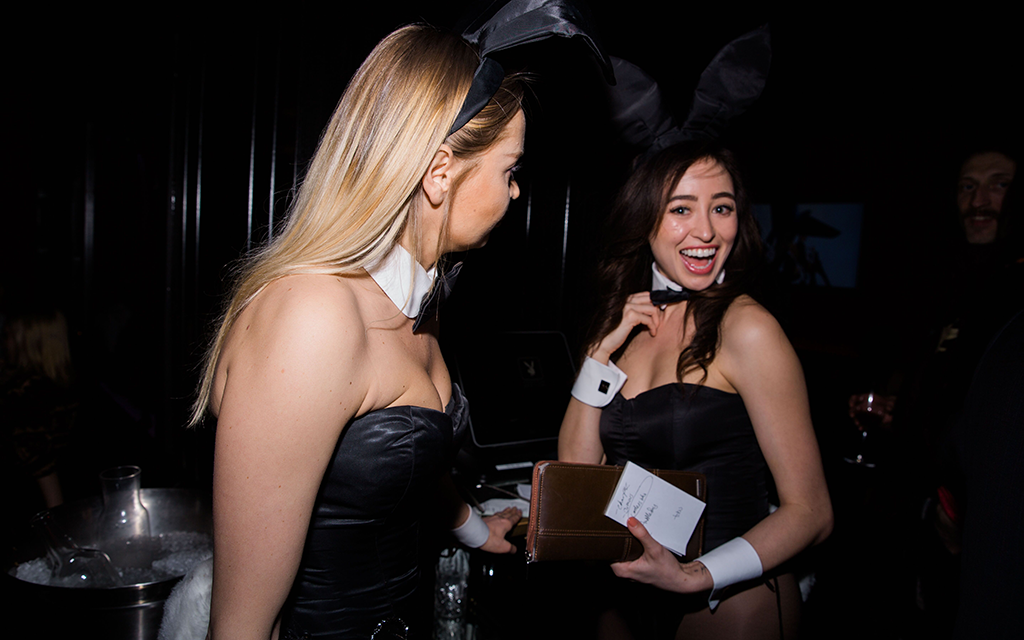
In 2019, that’s a question a lot of people have. The club reopened in September, 32 years after the original Manhattan Playboy Club on East 59th Street shuttered following years of declining interest in the brand. Decades after Hugh Hefner himself declared the Playboy bunnies “a symbol of the past,” the new location opened its doors to an even more skeptical generation, with some critics questioning the brand’s relevance in the #MeToo era.
The club’s reopening came amid an apparent Playboy renaissance that’s attempted to break ground in recent years, in response to a decade of decline for the brand since The Girls Next Door aired its last episode in 2010.
Demeaning or not, Playboy’s early-aughts reality TV success may have represented the brand’s last era of major, mainstream popularity. As the magazine’s circulation rates continued to dwindle, the Playboy empire seemed ready to accept defeat, making headlines not only for the sale of the iconic Playboy Mansion, but also for the decision to drop nudity from the very magazine with which it had become synonymous.
In 2017, however, nudity made its triumphant return, spearheaded by Playboy heir Cooper Hefner. Then Playboy’s Chief Creative Officer, Hugh Hefner’s son seemed poised to launch a new era of the Playboy brand fit for the modern sexual climate.
“Creating something that resonates with my generation and the generation that comes after mine is how I’ll measure my accomplishments,” the younger Hefner told The Hollywood Reporter of his plan to return to a pre-reality TV era of Playboy inspired by the brand’s often-obscured history of social and sexual activism.
Two years on, however, the brand still seems to be struggling to find its footing in a post-#MeToo era. Last fall, critics slammed the reintroduction of the Playboy Club’s lingerie-clad waitresses as “tone-deaf.” Earlier this month, Hefner announced his departure from Playboy amid continually falling circulation rates.
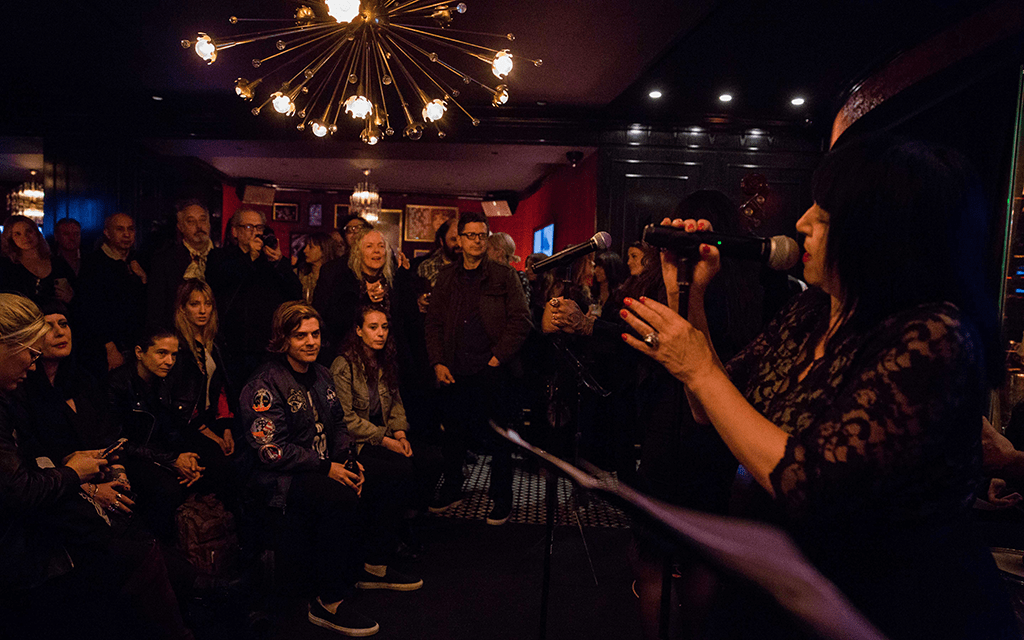
Perhaps it’s the fetid majesty of a decaying empire that attracted Lunch to the Playboy Club tonight. Surrounded by bunnies in black silk — a modern upgrade from the rainbow of uniforms sported by the bunnies of yesteryear — the black-clad Lunch, wearing the same pointed-toe pumps as the bunnies, spits verse about “future crimes” and “heinous acts” she will “undoubtedly get away with.” Perhaps Lunch and Playboy aren’t so ill-matched after all. In 2019, maybe Playboy is coming back around to its once-subversive roots — just in a more modern way.
When the set ends I text my best friend, who’s annoyed that she’s been unable to reach me.
“Sorry, I don’t get good service down here,” I write.
“Are you in a dungeon?” she asks, and I realize I’m not sure why I phrased it that way, either. I don’t remember walking down any stairs upon entering the club, but something about it certainly feels underground.
This article was featured in the InsideHook newsletter. Sign up now.
